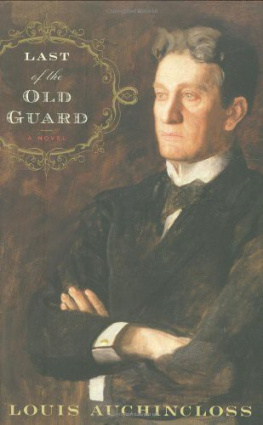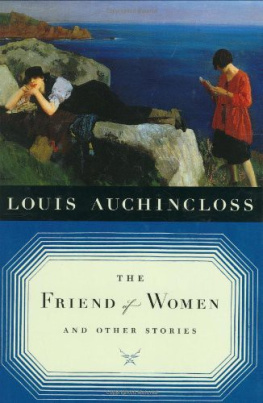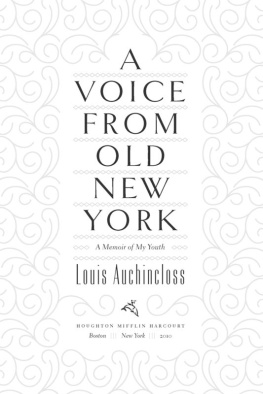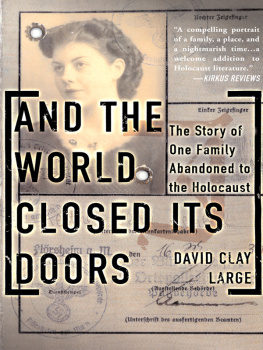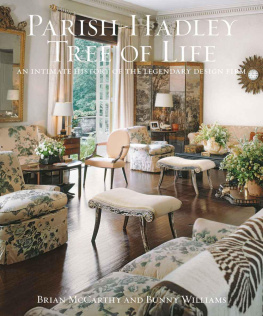Copyright 2008 by Louis Auchincloss
All rights reserved
For information about permission to reproduce selections from this book, write to Permissions, Houghton Mifflin Harcourt Publishing Company, 215 Park Avenue South, New York, New York 10003.
www.hmhbooks.com
The Library of Congress has cataloged the print edition as follows:
Auchincloss, Louis.
Last of the old guard / Louis Auchincloss.
p. cm.
ISBN : 978-0-547-15275-2
1. LawyersFiction. 2. Law firmsFiction. 3. Practice of lawFiction. 4. Law partnershipFiction. 5. Male friendshipFiction. 6. New York (N.Y.)Fiction. I. Title.
PS 3501. U 25 L 37 2008
813'.54dc22 2008011291
e ISBN 978-0-547-10760-1
v1.1012
TO MY GRANDDAUGHTER ,
Lily Sloane Auchincloss
1
T HE DEATH OF MY famous law partner, Ernest Saunders, my lifelong friend and exact contemporary, two years ago, in 1942, at the age of eighty-four, has left me the prey, not only of a peculiar loneliness, the perverse kind that waits on one who is still surrounded by a persistently friendly world, but also the kind that is flooded by the ungovernable tide of mixed reminiscence that inundates the emptiness of old age. Ernest, in his last two years, had tried to distract me from the grief of losing my wife and no longer having enough to do at the officefor, unlike him, I had largely retiredby inducing me to write a history of the firm, and this I had done, as will attest the fat, red, privately printed Saunders & Suydam, resting unread in the library of every large New York firm. It is only natural that such histories are consulted only by lawyers checking the index to see if they are mentioned, as it cannot be expected that the author will reveal any failures of his institution or regale the reader with detrimental anecdotes about clients.
It was for this reason of professional tact that I have used in my history only half of the material available to me. There are private memoranda and personal letters in my file no part of which have appeared in my book. Yet they unquestionably contribute to a fuller understanding of the complicated personality of Ernest Saunders. So what to do with them? I finally decided to put them together in this compendium and leave it to my conscientious son, Robert, himself a member of the firm, my "blameless" and faithful Telemachus, "discerning to fulfill this labor," to dispose of as he sees fit. He may well choose to destroy them, in whole or in part.
I share the double name of our great corporate law firmSaunders & Suydamwhich we have never changed, despite our mammoth growth, since he and I founded it in 1883, thus avoiding squabbles among new partnersbut my share of the power has been similar to that of the second or third consul in the consulate of Napoleon. Yet Ernest never forgot, for all his reputation as one of the nation's greatest corporation attorneys, that he and I first hung out our shingle as a simple duo with one secretary and that I brought in the first big client.
"It was you who really got us started, Adrian," he constantly reminded me. "And when my tongue was sometimes a bit too acid, it was you who kept people from walking out the door. I may have been feared, but you, old boy, were always loved. And I'm not such an ass as not to know what too many people think makes the world go round."
Ernest wanted my history of the firm to be a monument to the institution he had largely created. He saw it as one of the vital forces that kept the too rapid industrialization of a virgin land within the limits of law. He took a good deal of credit for this. And it was not to dwell on the more personal aspects of this struggle that he wished to dedicate its history. For a fuller comprehension of how it all workedor at times didn'tone must gain some insight into the personality of Ernest Saunders. Where I wish to speak the whole truthinsofar as it is possible for any man to do sois to describe my personal reactions to everything about Ernest: my doubts, my enthusiasms, and my changing aspirations in the legal career that I have shared with him. His story and that of myself, Adrian Suydam, are inextricably entwined.
I have had what most people would call a happy and successful life. My sole marriage brought me joy and two children; I have made many good and trusted friends, some in high places; I have accumulated a considerable fortune, and the reputation of my law firm has already been touched on. I have also enjoyed rude health and what I have often been told are striking good looks. But the question remains: Have I made the best use of my unquestioned advantages? Have I even made a respectable use of them?
To say that my family was old New York is to note the principal feature about them. The Suydams had come over with Peter Stuyvesant and never budged farther west than Manhattan Island except to escape the summer heat. They had prospered, like the wiser of their kind, by hanging on to local real estate in the path of the expanding city and had intermarried with the wealthier of the more newly arrived British. I am descended, for example, from Chancellor Livingston as well as peg-leg Peter. By the third quarter of the last century, when I was a boy, the Suydams were among the bulwarks of the rigidly conservative and utterly complacent brownstone society that stretched from Union Square to the East Sixties and thought it had the answer to everything.
They were at first scornful of the new fortunes that inundated their sober streets in the wake of the Civil War. In time they would come to terms with Vanderbilts and Goulds, principally at the altar, but in my youth new money was still odoriferous, and my mother regarded the ball-giving Mrs. Astor as her equal, not because of her empire of squalid tenements but because she had been born a Schermerhorn. Mamma's interior, behind its drab street front, was a Victorian clutter, but as scrupulously brushed and neat as her person, and she presided with sublime composure over a little world where sex existed only in marriage and barely there, and where art was confined to sentimental novels or paintings of lovable pets. She was properly proud of a handsome and well-mannered son, and if she was aware that young men did things of which she could hardly approve, she had no complaint as long as they were kept out of sight. Appearance was all the reality a lady needed. She knew when not to ask questions. She didn't even want to.
Father, I believe, had his doubts, but he did not choose to voice them. Tall, slim, and faultlessly groomed, he made a fine approach when he strolled up Fifth Avenue with his feather-hatted, veiled consort on their way to a Sunday service. He was a great reader of history and spent much time in his dark leathery library through whose closed doors, passing in the hallway, I could sometimes hear the clink of a decanter against a glass. I think that the man Father yearned to have been was the author of The Conquest of Mexico. He was kind and gentle with me, his only son, but there was always something restrained in his manner of caring for me, as if he feared that if he intervened too much he might make me too like himself. Did he hope that, left alone, I might turn into something better? Was this love? It was a kind of love, anyway, and I sensibly made the most of it. Did a good instinct tell me that it was all I was going to get from my family in the way of emotional support?
I have said that being of old New York was the most significant thing about my family, but, to me anyway, the most significant thing about my father was that he hadn't fought in the Civil War. Like thousands of his well-to-do contemporaries he had purchased a substitute for $300. This was not at the time considered a base alternative: Father had a wife, a young son, and a goodly amount of real estate to manage. But in the years following the war, when the conflict was romanticized and the glorious victory extolled, a failure to have served became, not a disgrace, but a thing not mentioned on social occasions, like sex or politics. Of course, with children, there was no such inhibition, and at school I sometimes had to suffer the military feats of other boys' fathers being flung in my face. My always-ready fists were a deterrent to any reference to the absence of such feats in my own family, but the comparison was inevitable, and I couldn't vocally resent it. Nor could I bring myself ever to discuss the matter with Father. I was always a sensitive child and knew how deeply it would hurt him. And I loved him. He got all the love that my socially and medically preoccupied mother seemed little to need.
Next page
